Della Lamb and JVS Seek New Employer Partnerships
By Sophia Donis
Refugee resettlement continues to reach new heights as record numbers of refugees are welcomed across Missouri. As of June 30, 2024, over 2,000 refugees have been resettled across the state, marking a significant increase from the 1,563 refugees resettled last fiscal year.
This steady influx of new arrivals and lack of job openings has presented a unique set of challenges for local resettlement agencies. In Kansas City, local resettlement agencies Della Lamb Community Services and Jewish Vocational Service (JVS) are seeking new employer partnerships to connect more clients with job opportunities and start them on the path toward self-sufficiency.
“Refugees and immigrants, by picking up their entire life and moving to a new, unknown place where they may or may not know another soul, that is an entrepreneurship ethos,” said Joan Kelly, JVS Community Integration Director. “That is an entrepreneur at the very heart of things. The idea that ‘I have skills; I have the ability to create the life that I want.’ That’s the spirit that employers love to have.”
Each refugee arrives with different skills and varying levels of education, but all have the same goal of obtaining steady employment. By partnering with local resettlement agencies, employers can fulfill their staffing needs and positively impact the lives of their new neighbors.
Support During the Hiring Process
Through their local resettlement agency, refugees can enroll in employment programs to receive help finding a job. Caseworkers assist with job applications, interview preparation and paperwork during the onboarding process.
Local resettlement agencies provide job readiness classes to teach refugees about the U.S. workforce, so newcomers are adequately prepared and know what to expect on the job. Classes cover topics such as communication with supervisors, the importance of punctuality, navigating public transportation and more.
“We don’t just get our clients jobs and say ‘good luck,’” said Sarah Kolsto, Della Lamb Refugee Services Director. “We continue to walk with them throughout the process. We’re reinforcing what the employer needs and wants as well as caring for our client.”
Creative Solutions to Employment Barriers
An employment barrier seen by both Della Lamb and JVS is the hesitancy of prospective employers to hire refugees who aren’t fluent in English. To combat this, Kelly invites employers to work with local resettlement agencies to find solutions.
“If the biggest barrier that our employers are [identifying] is that they need individuals that can speak English, then let’s make that a goal within the first year of someone being employed, that they are regularly attending ESL classes,” Kelly said. “Let’s solve these problems together.”
Momin Marofi, JVS Refugee Employment Manager, offers another solution: Hire refugee team leaders who are both fluent in English and their native language. These team leaders can bridge the gap between refugee employees and supervisors by helping to translate and explain cultural differences.
Refugees Are Ready to Work
As refugees begin acclimating to their new environments, they are looking for the opportunity to enter the workforce and embark on new career pathways. Kelly says that the strongest members of her team have experience creating better lives for themselves and leverage that experience in the workplace.
“I know refugees and immigrants are incredible employees because they make up the vast majority of our workforce,” Kelly said. “At JVS, almost every direct service provider in our organization is a refugee or immigrant. Fifty percent of the managers on the Community Integration team are refugees and immigrants and have that lived experience.”
For employers looking to hire refugees, email Briana Taylor, Della Lamb Workforce Development Manager at btaylor@dellalamb.org, or Joan Kelly, JVS Community Integration Director at jkelly@jvskc.org.
Current and prospective employers can also find tailored resources on the MO-ORA resource guide.
